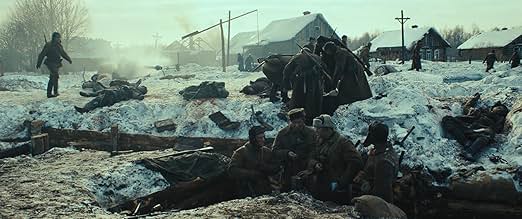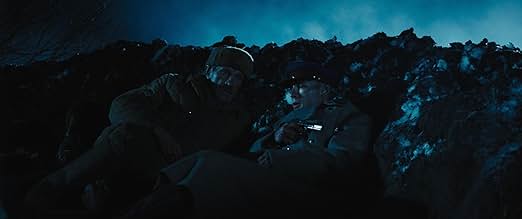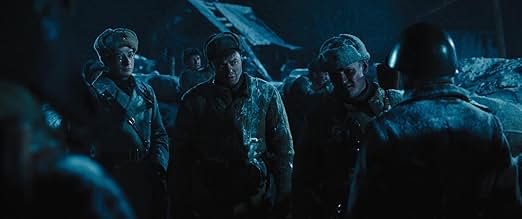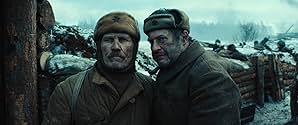IMDb-BEWERTUNG
6,1/10
1448
IHRE BEWERTUNG
Kriegsepos, das ohne Romantik und Pathos den Alltag gewöhnlicher Menschen beschreibt, die durch einen Krieg aus einem friedlichen Leben herausgerissen wurden.Kriegsepos, das ohne Romantik und Pathos den Alltag gewöhnlicher Menschen beschreibt, die durch einen Krieg aus einem friedlichen Leben herausgerissen wurden.Kriegsepos, das ohne Romantik und Pathos den Alltag gewöhnlicher Menschen beschreibt, die durch einen Krieg aus einem friedlichen Leben herausgerissen wurden.
- Regie
- Drehbuch
- Hauptbesetzung
- Auszeichnungen
- 1 Nominierung insgesamt
Daniil Voropaev
- Sgt. Lavrov
- (as Danila Voropaev)
Empfohlene Bewertungen
I have no idea why the 5.8 score exists for this film. It truly is bewildering. Apparently the people scoring this film low are either Soviet sympathizers, Nazi sympathizers, or hate realistic war films?
I don't know. The low score makes no sense to me.
What does make sense to me is that director Igor Kopylov crafts a fine film around one of the many pivotal battles that helped shape Russia's eventual victory over the Germans leading up to the battle of Stalingrad.
Ovsyannikovo was one of the many small strategic points in the battlefield that the Soviets needed to capture to push the Germans out. The film itself is just a small look at the many lives lost trying to capture and secure this small village.
The film does a fine job of not shying away from the brutal and sadistic nature of the Germans to secure victory (massacring and raping civilians) and then systematically wiping out opposing forces.
The film also does a fine job of making it known that some of the biggest hurdles the Russian army faced in the war was from Soviet leadership!
The bureaucracy and stupidity of the Soviets cost many great and brave men their lives. A central sub-plot to the film outlines how the already thinning company would lose additional soldiers over the most trivial and banal of things.
But this is what happened, and this is why so many Russians died during World War II (and thereafter during the reign of the Soviet Union).
As far story structure is concerned, the film mostly only centers around the men stationed Ovsyannikovo, with a few snippets of the commanding officers trying to justify their logic in not sending reinforcements or properly aiding their soldiers. I almost wanted to spit into the face of the commanders wasting he lives of these brave soldiers; that's just how engrossing the film had become.
But what's more is that all of this feels authentic. Kopylov makes the battles feel grounded and realistic for the most part, and some soldiers suffer shell shock, PTSD, delirium and panic attacks, just as you would expect under those conditions. The violence is also fairly visceral and realistic; the special effects team make use of both squibbing and CGI, so while those of you who may hate the look of CGI blood, there is still some squibbing effects that help highlight the realism of the gun battles.
Overall, it's a fascinating watch. Of course it's not as over-the-top and action-packed as T-34, but it is very similar to Kim Druzhinin and Andrey Shalopa's tightly hewn war-thriller, Panfilov's 28. Ignore the low rating, I'm not sure what's going on with that, but if you can find a way to view this film definitely give it a watch.
I don't know. The low score makes no sense to me.
What does make sense to me is that director Igor Kopylov crafts a fine film around one of the many pivotal battles that helped shape Russia's eventual victory over the Germans leading up to the battle of Stalingrad.
Ovsyannikovo was one of the many small strategic points in the battlefield that the Soviets needed to capture to push the Germans out. The film itself is just a small look at the many lives lost trying to capture and secure this small village.
The film does a fine job of not shying away from the brutal and sadistic nature of the Germans to secure victory (massacring and raping civilians) and then systematically wiping out opposing forces.
The film also does a fine job of making it known that some of the biggest hurdles the Russian army faced in the war was from Soviet leadership!
The bureaucracy and stupidity of the Soviets cost many great and brave men their lives. A central sub-plot to the film outlines how the already thinning company would lose additional soldiers over the most trivial and banal of things.
But this is what happened, and this is why so many Russians died during World War II (and thereafter during the reign of the Soviet Union).
As far story structure is concerned, the film mostly only centers around the men stationed Ovsyannikovo, with a few snippets of the commanding officers trying to justify their logic in not sending reinforcements or properly aiding their soldiers. I almost wanted to spit into the face of the commanders wasting he lives of these brave soldiers; that's just how engrossing the film had become.
But what's more is that all of this feels authentic. Kopylov makes the battles feel grounded and realistic for the most part, and some soldiers suffer shell shock, PTSD, delirium and panic attacks, just as you would expect under those conditions. The violence is also fairly visceral and realistic; the special effects team make use of both squibbing and CGI, so while those of you who may hate the look of CGI blood, there is still some squibbing effects that help highlight the realism of the gun battles.
Overall, it's a fascinating watch. Of course it's not as over-the-top and action-packed as T-34, but it is very similar to Kim Druzhinin and Andrey Shalopa's tightly hewn war-thriller, Panfilov's 28. Ignore the low rating, I'm not sure what's going on with that, but if you can find a way to view this film definitely give it a watch.
At last a real good Russian war movie, about the Great Patriotic War, a subject rarely close to real, actual events. There are batches of garbage propaganda stuff, where the Germans are always shown as idiots - idiots who provoked more than 25 millions deaths among the Russian population.....Here, the focus is on the Political Commisars, the Politrouks, who killed anyone who hesitated to fight. This point of view was rarely spoken in Russian movies. In this film, the enemy is maybe more them than the Germans. Political commissars and their bloodthirsty decisions, who ordered the deaths of thousands of soldiers only to take a simple hill. For Staline and his gang, the human life of their own fellows was nothing. They were more than Germans; one Nazi for one hundred Russians. An unbalanced fight. I have always found weird and not logical that people defending their life, freedom and homeland - the Russians - needed Political commissars to prevent them to desert.....The Nazis did not in Russia; maybe for obvious reasosn though. Where a deserter would have been, among the "Untermenschen", slavic "under men'; they were safer in the middle of their own "kameraden'...So, to summarize, I highly recommend this feature.
What make the difference between russians war movies and american ones is beside in russian movies plays actors like actors no thirsty for money inferior formes of life.the fact all russian war movies are inspired by real events who realy take place, not like in american movies all crapy fictions like their contribution to the defeating of Germanyin WW2.
The opening battle scene was good but suffered from war movie clichés, like having a guy drag another to safety only to find half his body missing. They also have those stock characters, the scavenger, the harsh Commissar, and the heroic, square jawed commander. But as the movie progresses, the actors settle into their roles. The commander is especially likable.
The movie is well structured. After the opening battle there is a tense pause before the German counter-attack. This gives the actors time to show us the state or the Red Army in 1942. We see the tension between the regular army and the Commissars. All war movies glam up battle scenes but it was less than a typical American production.
The behavior of the Commissars is portrayed negatively but we hear enough to understand why they identify so strongly with the state. This does not justify them but it lets you see them as humans who took a wrong turn. The Commissars have logical, if flawed, reasons for their decisions as their heavy handedness creates hostility. After a tense argument, a Commissar refuses to send help to a unit that just took a position, blurting out, 'whatever we send them will be a total loss'. He assumes the officer is being emotional but he is not allowing the army to prove what they could do given resources at critical times. I thought this interplay was well done but you have to look for it, this good writing.
They used the church imagery effectively. You see it wherever they went. You see them standing next to a wall decorated with icons and in a basement. Religious themes can feel forced but here it felt natural. Even the Commissars, famous for their atheism, chose to ignore its presence rather than fight it. You could see this going through their minds with one uncomfortable glance. The Church belonged there the Germans did not. When a German emerged from an Orthodox church at night with a flame thrower, it was chilling. It was as if they were assaulting the essence of the town.
The Germans were a better foil here than in American movies. In U. S. movies they are portrayed as evil but incompetent. This detracts from their seriousness. Here they are deadly and their presence is like a dark cloud.
Except for a few common war movie tropes, this was a very good movie.
The movie is well structured. After the opening battle there is a tense pause before the German counter-attack. This gives the actors time to show us the state or the Red Army in 1942. We see the tension between the regular army and the Commissars. All war movies glam up battle scenes but it was less than a typical American production.
The behavior of the Commissars is portrayed negatively but we hear enough to understand why they identify so strongly with the state. This does not justify them but it lets you see them as humans who took a wrong turn. The Commissars have logical, if flawed, reasons for their decisions as their heavy handedness creates hostility. After a tense argument, a Commissar refuses to send help to a unit that just took a position, blurting out, 'whatever we send them will be a total loss'. He assumes the officer is being emotional but he is not allowing the army to prove what they could do given resources at critical times. I thought this interplay was well done but you have to look for it, this good writing.
They used the church imagery effectively. You see it wherever they went. You see them standing next to a wall decorated with icons and in a basement. Religious themes can feel forced but here it felt natural. Even the Commissars, famous for their atheism, chose to ignore its presence rather than fight it. You could see this going through their minds with one uncomfortable glance. The Church belonged there the Germans did not. When a German emerged from an Orthodox church at night with a flame thrower, it was chilling. It was as if they were assaulting the essence of the town.
The Germans were a better foil here than in American movies. In U. S. movies they are portrayed as evil but incompetent. This detracts from their seriousness. Here they are deadly and their presence is like a dark cloud.
Except for a few common war movie tropes, this was a very good movie.
I think when making the war movies, especially the WWII movies, the Russian movie industries is the very best, then the South Korean. Sorry, Hollywood is even worse than the Chinese movie makers. But the Chinese movies got a propaganda problem which is seriously censored by the CCP government. The modern Russia, on the contrary, when they made movies about WWII, besides to portray how bravely the Russian soldiers and the common citizens fought against the Nazi Germany invasion, they also used the opportunity to mock the ridiculous Soviet Russia's tight control of their military forces, like the CCP now controls everything. If you watch this movie, you would find such cynical mockery to their former Soviet Communist Party's stupidity. It asked the Russian soldiers to fight for their motherland, but at the same time, punishing those who were against their cruel communist policies.
I absolutely agreed with what the sole review said about this movie, this movie indeed captured me the whole time. The battle scenes are top notched directed, acted, edited, even the music is perfectly synchronized and so relevant with the battle scenes and all the situations. This movie is indeed one of the Best 2nd World War movies. Strongly recommended.
I also would like to recommend the following classic Russian movies for you; they are all great movies, most are about WWII:
Ballad of A Soldier (1959), The Forty-first (1956), The Cranes Are Flying (1957), Battle for Sevastopol (2015), Zvezda (The Star) 2002, The Tank Battalion (1991), Andrei Rublev (1966), Battalion (2015), Blizzard of Souls (The Rifleman) 2019, Fortress of War (2010)
I absolutely agreed with what the sole review said about this movie, this movie indeed captured me the whole time. The battle scenes are top notched directed, acted, edited, even the music is perfectly synchronized and so relevant with the battle scenes and all the situations. This movie is indeed one of the Best 2nd World War movies. Strongly recommended.
I also would like to recommend the following classic Russian movies for you; they are all great movies, most are about WWII:
Ballad of A Soldier (1959), The Forty-first (1956), The Cranes Are Flying (1957), Battle for Sevastopol (2015), Zvezda (The Star) 2002, The Tank Battalion (1991), Andrei Rublev (1966), Battalion (2015), Blizzard of Souls (The Rifleman) 2019, Fortress of War (2010)
Wusstest du schon
- WissenswertesDuring the last battle a jet trail can be seen in the sky
Top-Auswahl
Melde dich zum Bewerten an und greife auf die Watchlist für personalisierte Empfehlungen zu.
- How long is Rzhev?Powered by Alexa
Details
- Erscheinungsdatum
- Herkunftsland
- Sprache
- Auch bekannt als
- Rzhev - Unknown Battle
- Produktionsfirmen
- Weitere beteiligte Unternehmen bei IMDbPro anzeigen
Box Office
- Weltweiter Bruttoertrag
- 1.401.156 $
- Laufzeit
- 1 Std. 53 Min.(113 min)
- Farbe
Zu dieser Seite beitragen
Bearbeitung vorschlagen oder fehlenden Inhalt hinzufügen
























